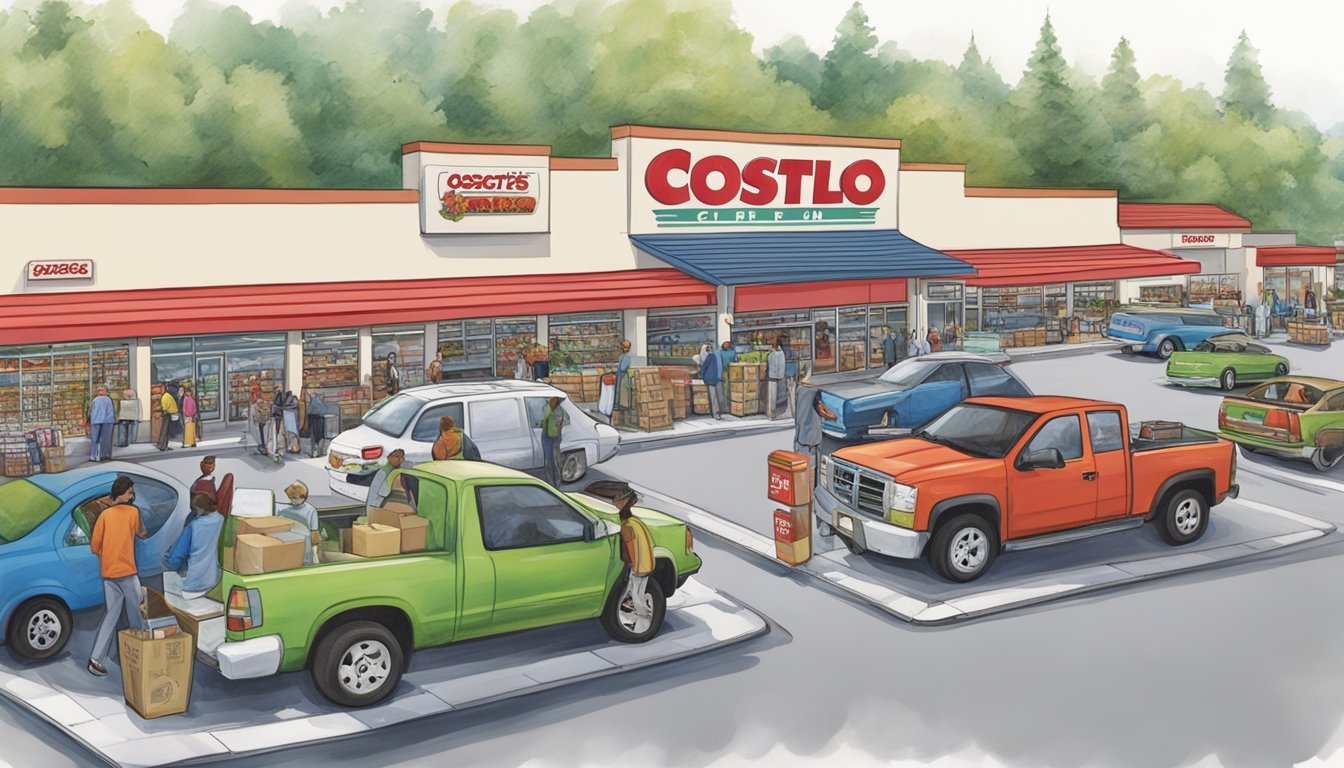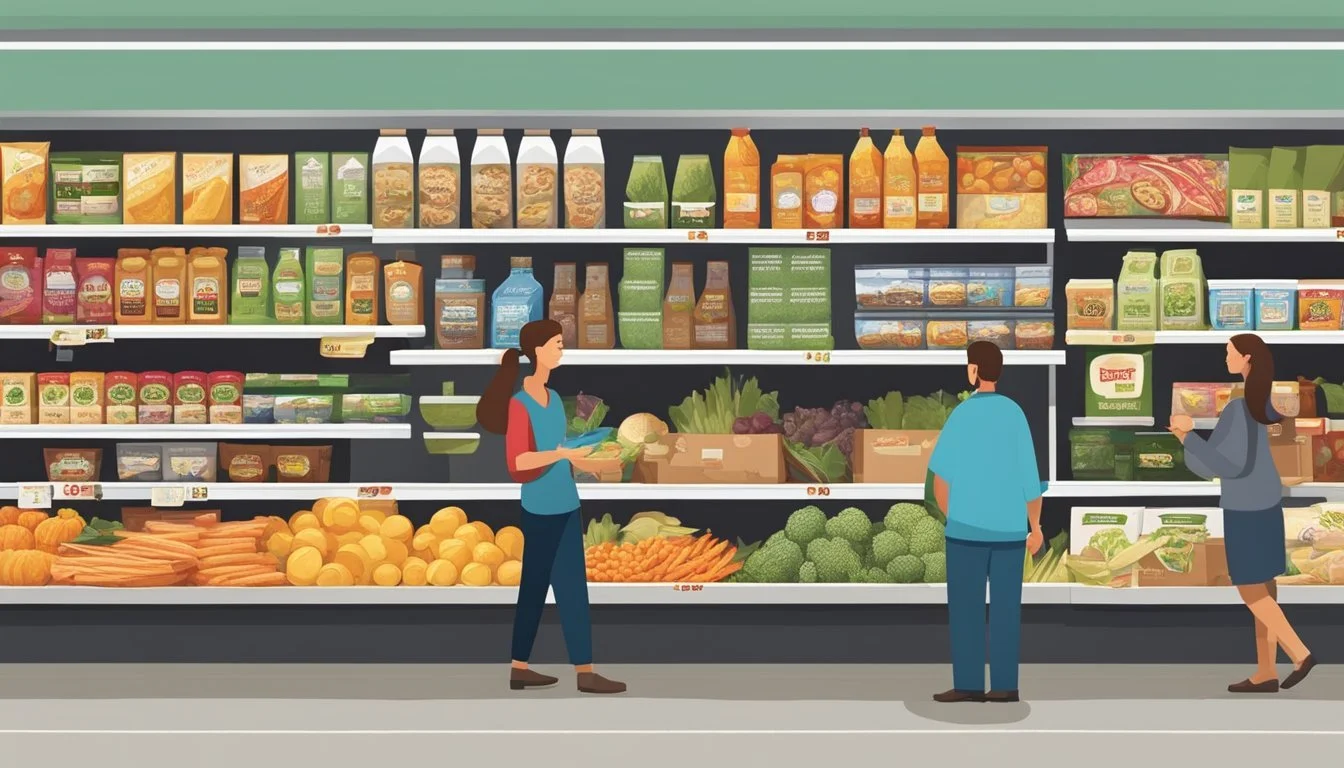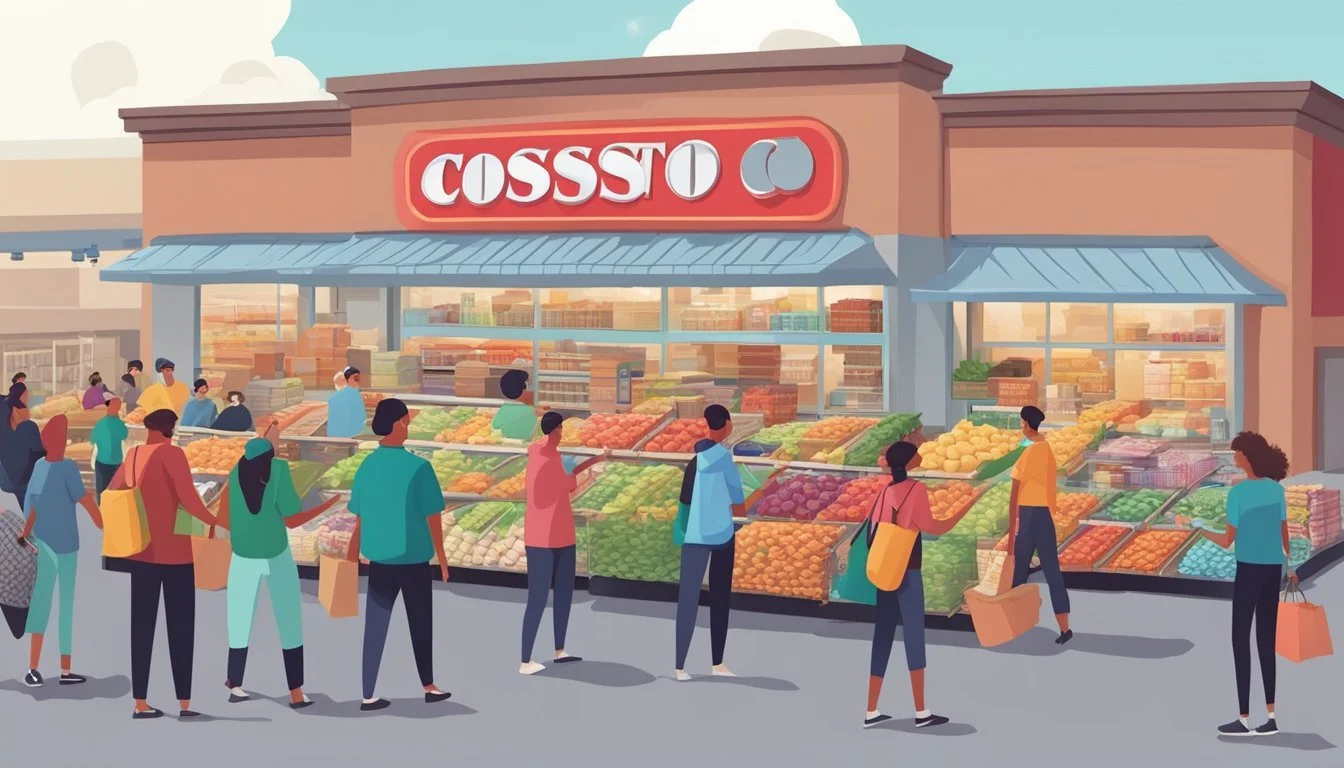Costco vs Trader Joe's
Comparing Shopping Experiences, Prices, and Selection
Part of Our Grocery Store Guide with Details on Costco and Trader Joe's
Costco and Trader Joe's are two retailers that have redefined the grocery shopping landscape in the United States. Both have cultivated loyal followings by offering unique shopping experiences, yet their business models and store environments are distinct. On one hand, Costco thrives as a membership-based warehouse club, appealing to customers who prefer bulk purchases and a wide array of products, including their own Kirkland Signature brand. The store's spacious aisles are stacked with large quantities of goods, offering notable savings for those who have the space to store them.
Trader Joe's, in contrast, offers a boutique-style experience, with a focus on private-label products and a smaller, more curated selection that changes frequently. With a keen eye on consumer trends, Trader Joe's delivers a carefully selected array of items, many of which bear a whimsical branding that has become a staple of their identity. Their stores often have a neighborhood grocer feel, providing a personal and inviting atmosphere that resonates with customers looking for specialty items or a quick and easy shopping trip.
While both retailers are celebrated for their customer service and competitive pricing, the choice between Costco and Trader Joe's often comes down to the individual shopper's needs. Those deciding where to shop might consider the size of their household, their storage space, and their appetite for unique and specialty products versus everyday staples. Each store's philosophy caters to different aspects of the consumer experience, making the "better" option subjective to the shopper's lifestyle and preferences.
Company Profiles
In the landscape of American grocery chains, both Costco and Trader Joe's have carved out distinct niches with unique business models and histories.
History of Costco
Costco, a membership-only warehouse club, was founded by James (Jim) Sinegal and Jeffrey H. Brotman. The first warehouse opened in 1983 in Seattle, Washington. The company is known for selling products in bulk quantities at competitive prices. Costco's strategy emphasizes high volume sales with low margins, which benefits from economies of scale and efficient distribution systems.
History of Trader Joe's
Trader Joe's started its journey in 1958 as Pronto Markets but was rebranded in 1967 by its founder, Joe Coulombe. It is a chain of neighborhood grocery stores offering unique food items, often organic and vegetarian, under its private label. Trader Joe's fosters a boutique experience with a focus on value and quality, often curating products to cater to the eclectic tastes of its consumer base.
Membership and Pricing
When shopping at Costco or Trader Joe's, one can expect different approaches to membership and pricing. Costco's model is membership-based with an annual fee which offers access to bulk purchasing at discounted rates. Conversely, Trader Joe's operates on a no-membership model where anyone can enjoy low-cost, quality items without an upfront fee.
Costco Membership and Fees
Costco operates on a membership model. Annually, individuals can choose from options like the Basic Gold Star Membership at $60 or the Executive Membership at $120, which offers additional benefits like a 2% reward on qualified purchases. Members can access savings on bulk items, with sale prices that are often difficult to match. Here is a breakdown of Costco's membership fees:
Gold Star Membership: $60
Executive Membership: $120
With these memberships, customers typically find that the savings on bulk goods can quickly offset the initial cost of the membership fee.
Trader Joe's Pricing Strategy
Trader Joe's does not require a membership. Instead, it offers products at a low-cost price point available to all its customers. The savings at Trader Joe's come from their private label strategy, meaning they often sell products under their own brand name. Customers find competitive prices on a variety of items, including organic and specialty products. Trader Joe's is known for its rotating selection of unique items, which keeps customers intrigued, and competitive pricing, which includes:
Private Label Goods: Often lower priced than national brands
Weekly Deals: Select items on discount
Trader Joe's fosters a shopping environment where anyone can enjoy what are often considered some of the best deals for the quality of the product offered.
Product Range and Quality
When comparing the product range and quality between Costco and Trader Joe’s, consumers will notice distinct differences in brand exclusives and store offerings. Costco is known for selling items in bulk and offers a wide variety of groceries under its in-house brand, Kirkland Signature, while Trader Joe's focuses on a range of exclusive products tailored to everyday shoppers, including fresh produce and specialty items.
Kirkland Signature Brand
The Kirkland Signature brand is a hallmark of Costco's commitment to quality. Under this label, shoppers find a vast array of products, ranging from pantry staples to gourmet items. Kirkland Signature nuts and cheese are known for their value, with nuts often sold in large quantities at competitive prices. For example, Costco sells Kirkland Signature Raw Almonds for $12.99 for three pounds, undercutting the price per ounce compared to smaller packages. The brand extends to other essential grocery items, as well, including milk and bread, aiming to provide members with high-quality options at lower costs due to bulk selling.
Trader Joe's Exclusives
Trader Joe's, on the other hand, prides itself on a wide selection of exclusive brands that cover everything from snacks to pantry essentials. Unique items like Trader Joe's peanut butter pretzels have become a staple, often favored over similar snacks found at Costco. Similarly, fresh products such as Trader Joe's produce section boast a range of organic options, including fresh basil. Their olive oil is also a standout, often touted for its taste and quality. While not typically available in bulk, Trader Joe's exclusives cater to a niche market looking for unique and flavorful grocery items that may not be found elsewhere.
Store Layout and Shopping Experience
When comparing Costco and Trader Joe's, shoppers will find distinct differences in store layouts that reflect each brand's unique approach to grocery shopping. Costco focuses on bulk buying, offering an expansive warehouse environment, while Trader Joe's prioritizes convenience with a more traditional grocery store setup.
Costco Bulk Buying Layout
Costco's layout is designed for bulk purchasing. Wide aisles and large open spaces characterize the warehouse-style stores. They accommodate the large pallets of goods that are a staple of the shopping experience. Shoppers are often drawn to Costco for its economy-sized quantities which can offer savings for those who have sufficient storage and can reasonably consume the bulk products before they expire.
Aisle Organization: Items in a typical Costco are categorized by type but spread out across the large floor space.
Packaging: Products often come in larger-than-average packaging, catering to those buying in higher volumes.
Trader Joe's Store Convenience
Trader Joe's designs its stores to maximize shopper convenience. The store's smaller footprint and thoughtfully organized shelves make it easy for customers to navigate and find what they need quickly.
Aisle Flow: Trader Joe's aisles are narrower, with a focus on easy-to-reach shelves and a straightforward layout.
Products: The selection often features unique and gourmet private-label brands that encourage shoppers to explore new food options within a manageable scope.
Each store's layout directly reflects its sales philosophy: Costco encourages bulk buying with its warehouse environment, while Trader Joe's appeals to everyday convenience and the discovery of novel products.
Food Quality and Selection
When comparing Costco with Trader Joe's, one sees distinct differences in their food quality and selection. Costco is renowned for its bulk offerings, while Trader Joe's offers a variety of unique and gourmet items.
Fresh Produce Comparison
Costco's produce section typically offers larger quantities, a boon for families and those looking to stock up. The selection focuses on common staples such as bananas, mixed greens, and berries. On the other hand, Trader Joe's provides customers with smaller, more manageable quantities of produce, often featuring seasonal and exotic options like fresh basil or heirloom tomatoes that cater to a variety of culinary ventures.
Meat and Seafood Options
Trader Joe's excels in offering a diverse range of pre-seasoned and marinated meats, making dinner preparation simpler for the busy consumer. Their selection of chicken, salmon, and bacon is generally smaller but curated. Costco counters with an emphasis on volume, selling larger packages of meat and seafood which may benefit customers with larger families or those seeking to meal prep.
Dairy and Bakery Offerings
In the dairy aisle, Trader Joe's showcases an assortment of cheeses from around the world, catering to both casual consumers and cheese connoisseurs. Although Costco also provides a selection of cheeses, its focus leans more towards larger packs of staple cheeses such as cheddar and mozzarella. For those looking for bakery items, Trader Joe's offers a range of bread, including artisan loaves and bagels. Costco, similarly, sells a variety of baked goods in bulk, which often include multipacks of bagels and loaves.
Both stores provide essentials like milk and eggs with differing approaches; Costco sells these in larger quantities, whereas Trader Joe's caters to customers needing more regular-sized purchases.
Shopping Strategies and Tips
When shopping at either Costco or Trader Joe's, customers can employ specific strategies to make the most of their grocery trips, ensuring they leave the store with the best deals possible on their favorite items, such as bananas, eggs, and almonds.
Maximizing Savings at Costco
Costco is famous for its buy in bulk philosophy, which can lead to significant savings for members. When shopping at Costco, customers should:
Track Sale Prices: Keep an eye on Costco’s sale items, often featured in their monthly coupon book. These sales can offer great discounts on staple goods.
Buy Store Brands: Purchase Kirkland Signature items, such as peanut butter or eggs, to enjoy quality comparable to national brands but at a lower price point.
Identify Best Bulk Deals: Some of the best deals at Costco include bulk purchases of bananas and almonds. Buying these items in large quantities can offer a lower unit price.
| Item | Unit Price |
|--------------|------------|
| Bananas | $0.39/lb |
| Almonds | $4.99/lb |Finding Unique Deals at Trader Joe's
At Trader Joe's, customers are presented with an array of unique and private-label items at competitive prices. Shoppers can save by:
Exploring Private Labels: Trader Joe's offers a wide range of products under its own brand, often at lower prices compared to national brands. Look for deals on items like fancy cheeses and canned goods.
Trying Seasonal Items: They frequently introduce new, seasonal items. These are often well-priced and offer a unique addition to one's shopping list.
Remember, both Aldi and Trader Joe's can provide cost savings on items such as eggs and peanut butter without the need to buy in bulk. Shoppers should compare these prices to ensure they're getting the best deals.
Additional Services
When comparing Costco and Trader Joe's, it's important to look beyond the shelves. Both retailers offer unique additional services that enhance the shopping experience.
Costco's Food Court and Samples
Costco is known for its food court, offering a variety of affordable meals and snacks — from pizza to hot dogs. Customers can enjoy a quick, inexpensive bite to eat before or after their shopping. Additionally, Costco's free samples are a staple service, allowing customers to try new products before they buy, boosting the overall shopping experience.
Trader Joe's Customer Experience Enhancements
Trader Joe's focuses on enriching the customer experience. Staff members are frequently hailed for being friendly and helpful, ready to assist and make product recommendations. Although not offering a food court like Costco, Trader Joe's provides a distinctive atmosphere, often featuring new and unique products for customers to discover.
Economic Considerations
When considering economic factors in grocery shopping, two key elements come to the forefront: how inflation impacts buying habits and the performance of grocery stores during economic downturns. Shoppers often weigh the benefits of potential savings against the risks of fluctuating prices. These elements are crucial when choosing between Costco and Trader Joe's.
Impact of Inflation on Grocery Shopping
Inflation can significantly affect grocery shopping, leading consumers to seek strategies to maximize their purchasing power. At Costco, customers can buy in bulk, which provides a hedge against inflationary pressures by locking in lower prices per unit, leading to long-term savings. This approach is especially advantageous when sale prices are available.
Trader Joe's, on the other hand, offers a diverse assortment of products without the necessity of bulk buying. While this might seem less economical during inflationary periods, Trader Joe's in-house brands typically provide lower prices compared to national brands. The store also strives to maintain consistent and competitive pricing, which can be beneficial for consumers not looking to buy in large quantities or those with limited storage space.
Costco vs. Trader Joe's during Economic Downturns
Economic downturns often prompt consumers to become more price-conscious. Costco's business model shines in such situations, as bulk buying can lead to significant savings. Costco members can take advantage of the savings by purchasing larger quantities, which is cost-effective but requires a membership fee.
Trader Joe's attracts customers by offering a variety of quality products at reasonable prices without the need for a membership fee. During economic downturns, Trader Joe's maintains a loyal customer base that values the store’s unique offerings coupled with the potential for savings on a wide range of products.
Shoppers' preferences during economic challenges may vary, but both stores have proven to appeal to consumers seeking value—whether through bulk buying at Costco or curated selections at Trader Joe's.
Consumer Preferences and Trends
Consumer preferences in grocery shopping trends reveal a divide between those seeking cost efficiency through bulk purchases and those prioritizing organic and specialty items for their household needs.
Organic and Health-Focused Products
Organic and health-focused products have seen an increase in demand as consumers become more health-conscious. Trader Joe's excels in this area by offering a wide variety of organic options, including fresh basil, produce, and various health-centric food products. Their produce section is tailored to meet the needs of customers looking for fresh and organic choices.
Preferences for Bulk vs. Specialty Items
On the flip side, preferences for buying in bulk have also solidified, with stores like Costco catering to this market segment. They make it easy for customers to purchase items like almonds, peanut butter, and other nuts and snacks in large quantities, which can be more cost-effective for households that consume these staples regularly._bulk purchases offer savings that appeal to consumers who prioritize budget and have adequate storage space.
Conclusion
Costco and Trader Joe's each offer distinct shopping experiences that cater to different needs. Costco operates on a membership basis, providing customers with bulk items often at a lower per-unit cost, making it ideal for large families or those looking to stock up. Its vast warehouses require a significant amount of space per store, which might affect the number of accessible locations in certain areas.
Trader Joe's, on the other hand, has smaller store footprints, and its range mainly consists of their own in-house branded items. Their stores offer a curated selection, focusing on unique and gourmet products, which appeal to shoppers looking for specialty items or those who shop for smaller households.
Costco:
Bulk purchases
Membership required
Larger store size
Potentially better savings over time
Trader Joe's:
Smaller stores
Focus on unique and house-branded items
No membership required
Caters to average shopper's daily needs
In terms of customer service, both stores score high marks. It ultimately comes down to the shopper's priorities, whether those are savings, product uniqueness, or purchasing volume. Shoppers may prefer Trader Joe's for everyday grocery shopping and the discovery of new products, while Costco may serve as a better choice for budget-conscious bulk buying. Customers are encouraged to consider their personal shopping preferences and needs when deciding between the two retailers.










